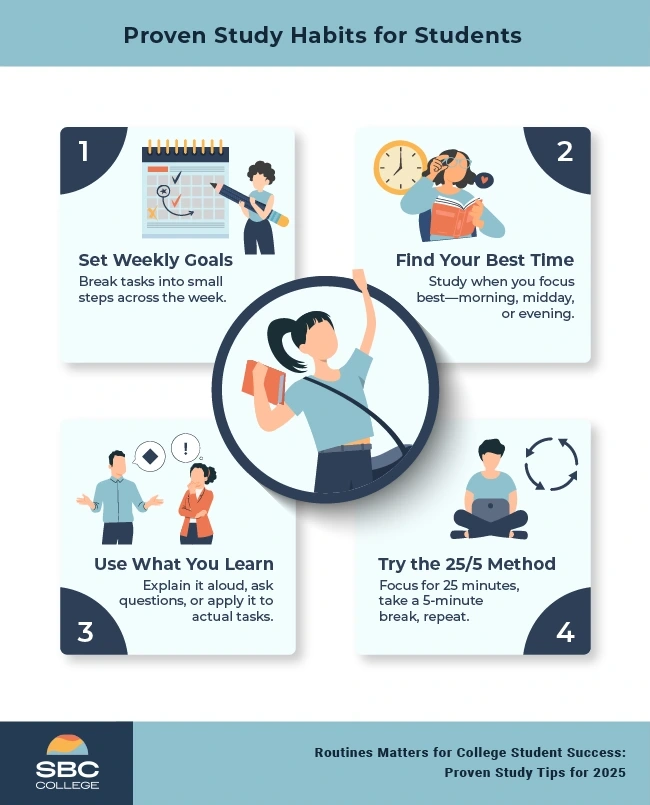Table of Contents
“I don’t have hours to study today. How can I make it count?”
It’s a question many adult learners ask when returning to school.
Your morning might begin with school drop-offs or prepping lunches. Evenings often disappear into shift work, errands, or catching up on everything else. When there’s barely a moment to spare, the right study habits can help you make the time you do have truly count.
That’s why building a simple study routine matters. Even if you only have short windows to study, approaching them with focus and a clear plan helps you stay focused and avoid falling behind when life gets busy.
In this article, you’ll explore daily habits for study success in 2025, practical ways to build a routine around your schedule, and how SBC College supports students in achieving their goals.
Listen to: Routines Matter for College Student Success: Proven Study Tips for 2025
Why Study Routines Are Essential for 2025 Success at SBC College
A routine gives your study time direction. You’re not deciding when to begin or what to work on. The plan is already set, which makes it easier to start, stay focused, and maintain a work-life balance.
Before each session, preparing your space can help you settle in. That might mean clearing your desk, opening your course materials, or putting away anything unrelated to school. These small actions signal that it’s time to begin.
Once your study space is ready, choosing a dedicated time adds another layer of consistency. Whether it’s before your morning coffee or after dinner, having a familiar window gets you into the learning mindset right away.
And if your day takes an unexpected turn, your routine can help you reset.
Curline L., who teaches both Human Resources and Applied Administrative Procedures at SBC College, emphasizes the importance of routine for staying focused:
“When students have a routine to fall back on, they’re less likely to feel discouraged. It helps them feel more settled and makes it easier to focus, even if the day looks a little different than usual.”
Over time, your routine helps you stay engaged, achieve your daily goals, and build habits that support academic success throughout your program.
Proven Study Habits for SBC College Students
Once you’ve decided on your study routine, the next step is to use your time efficiently. The habits below can help you stay on track, feel more in control, and retain what you’re learning.
Set Small, Achievable Goals Every Week
Think about what you’ve recently covered in class and use that to set one or two study goals for the week. Depending on the diploma program you’re enrolled in, that could involve reviewing key terminologies, practicing using course-related software, or preparing for an upcoming assignment or project.
To stay focused, try sorting your weekly study tasks into four categories:
- Urgent and important – finishing an assignment that’s due soon
- Urgent but not important – responding to academic messages during study time
- Important but not urgent – organizing your notes, reviewing terminology, or practicing with course-related software
- Not urgent and not important – checking social media during scheduled study blocks
This approach helps you prioritize your learning goals and cut down on distractions during the week.
Stick to a Personalized Study Schedule
Are you a morning person who feels active early in the day, or do you concentrate better once everything else has gone to bed? Study when your energy levels are at their peak. That might be before work, during a quiet lunch break, or later in the evening once the house settles.
Some students review flashcards on the bus. Others fit in a short study session after dinner. Try a few time slots and see when you retain information more easily. Once you find what works, make it a part of your regular routine.
Practice Active Learning: Take Notes, Ask Questions, Teach Others
The best way to retain what you’ve learned is to use it right away. After a study session, try active learning techniques like saying the concept out loud, writing it down, or recording a quick voice note. If something doesn’t make sense, write down a question to follow up with your instructor.
Teaching someone else can help reinforce what you’ve studied. Try walking a classmate through a concept or summarizing it to a friend. Talking it through helps you organize your thoughts and see where you might need more clarity.
You can also apply what you’ve learned in simple ways. For instance, if you’re in the Graphic Design Specialist Diploma Program, recreate an ad or logo you’ve seen online using the tools you’ve been taught. If you’re enrolled in the Administrative Assistant Diploma Program, try creating a polished email or organizing a week’s worth of meetings using a digital calendar. These small actions make what you’re learning easier to remember and use when it counts.
Use Short Breaks Wisely: The 25/5 Method
You might relate to this: You sit down to study, and suddenly your phone lights up. One message leads to another and before you know it, you’ve lost your focus.
The 25/5 method (also known as the Pomodoro technique) helps you take control of your study plan from the start.
Here’s how it works:
Step 1. Set a timer for 25 minutes and focus fully on your studies.
Step 2. Take a 5-minute break—walk around, stretch, or grab some water.
Step 3. Repeat the cycle if you still have time and feel up to it.
Even one focused round can help you absorb the material and finish with less fatigue.
Not every method works the same way for everyone, and that’s okay. The point is to try a few, notice what keeps you focused, and build your routine around that.

How SBC College Support Services Help You Stay on Track
SBC College offers student support designed for how people learn today. Instructors with years of industry experience are available to answer questions, explain course material, and help you stay aligned with your schedule.
Blackboard is where student resources come together. You can access lessons, assignments, and instructor messages in one place. If you need help using the system, tech support is available.
Your course outline gives you a clear view of what to focus on each week. It can help you plan ahead and make the most of your study time.
Learning alongside others can also make a difference. Many students connect with classmates to exchange ideas, stay motivated, or work through study goals together. That kind of connection can help keep you engaged throughout your program.
Adapting Routines for Online and Campus Learning

Study routines work across all learning formats, but how you build them depends on your setting. In-person learners often plan their schedules around class times, travel, and access to on-campus spaces. Those windows between classes can be useful for reviewing notes, finishing readings, or checking in with instructors. Having a regular place to study on campus can also make it easier to stay focused.
With online learning or hybrid education, you have more control over your time. That flexibility makes it even more important to build consistent habits. Setting regular times to check your course platform, go through materials, and complete assignments can help you stay on track. Even small habits like preparing your workspace and writing out your goals before each session can support better focus.
No matter where you study, the most effective routines are the ones you can return to. They support your progress and give you a way to keep learning when your schedule shifts.
How Strong Routines Build Your Career Skills Early
The habits you develop as a student will carry over into your workplace. Employers value people who manage their time well, meet deadlines, and stay organized when handling multiple priorities.
By sticking to a routine, you’re already building the kind of discipline that leads to student success and prepares you for real-world responsibilities. You’re learning how to plan ahead, follow through, and manage your workload across several subjects or tasks.
Even something as simple as reviewing material consistently or checking in with your instructor mirrors how you’ll communicate and follow up in a professional setting.
Employers notice that kind of preparation. An employer who recently hired an SBC College graduate said:
“She has been a great addition to our team. Professional, great attitude, work ethic, the whole package.”
— Colleen L., Office Manager, McMorrow Construction
The more you build those habits now, the more ready you’ll be when new opportunities come your way.
Study techniques only work when they fit your routine. Picking the right time, dividing your workload into smaller steps, and using strategies like active learning or the 25/5 method can help you make steady progress.
Along the way, you’re also building career skills, including time management and planning, that carry over into the workplace.
If you’re planning to return to school and want support building strong study habits, contact an admissions advisor today.
Frequently Asked Questions (FAQ)
1. Why are daily study routines even more important?
Daily study routines help you stay consistent. When study time is built into your day, it becomes part of your rhythm. You spend less time deciding what to do and more time making progress. Even short sessions add up when they happen regularly.
2. How should I structure my weekly study schedule at college?
Start by blocking time for each course across the week. Use early-week sessions to review new material and end the week by checking your progress or preparing for upcoming assignments. Choose times that work with your energy levels and other responsibilities.
3. What’s the best way to stay motivated with online classes?
The best way to stay motivated is to keep a steady routine and set clear goals for each week. When you know what you’re working toward, it’s easier to stay focused. Checking your progress regularly and reminding yourself why you started can help you stay committed. Staying connected with classmates or checking in with your instructor also makes the experience feel more interactive and less isolated.
4. How can academic advising at SBC College help me improve my study habits?
Advisors can help you create a realistic study plan, recommend learning strategies, and suggest ways to balance coursework with other commitments. They also check in during your program to help you stay on pace and adjust your routine if needed.
5. Should I adjust my study routine if I work part-time?
Yes. It’s important to build study habits that fit your work schedule. Choose times when you’re most alert and plan your study blocks around your shifts. You might need to study in shorter sessions, so focus on one goal at a time. Keep your schedule flexible enough to shift when your work hours change.
6. Can short study sessions really be more effective than long cramming sessions?
Yes. Short, focused sessions help you absorb and recall information better. Studying a little each day gives your brain time to process what you’ve learned, which leads to better understanding over time.






